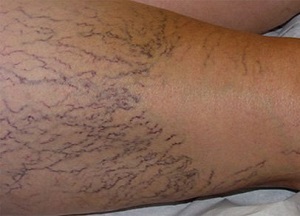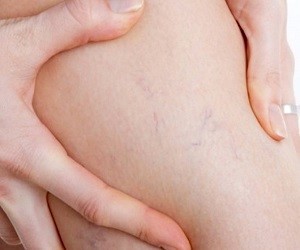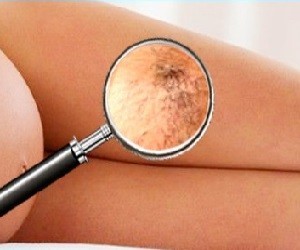
Almost all women have heard of varicose veins. Even girls in their twenties are susceptible to this disease. However, most of them face this problem during pregnancy, especially women with hereditary predisposition.
Initially, the defect is only cosmetic, but over time, the pain appears. In advanced conditions, the disease can turn into thrombophlebitis (a common complication of varicose veins), which can harm the mother and the unborn child. How to avoid such consequences, the best recipes for the treatment of varicose veins, as well as to prevent the disease - all this you will learn in the material below.
Causes
Carrying a baby is a difficult test for a woman, especially in the second half of pregnancy. During this period, the lower body is under constant tension for significant loads. Blood vessels can not cope with the accumulated work and explode, which is the main cause of varicose veins in the legs of expectant mothers.
In addition, it increases blood flow to feed not one organism, but two, in some cases three at the same time! The uterus increases in size, pressure increases and impedes natural blood flow, which is another important factor that provokes this disease.
There are other reasons for the development of the disease:
- rapid weight gain, overweight;
- recurrent pregnancy;
- physical inactivity, sedentary work;
- changes in hormonal background;
- hereditary tendency;
- bad habits;
- bathe for a long day.
Also, all latent or chronic diseases are exacerbated during pregnancy, so seek disease prevention. If the problem still arises, use prescriptions for treatment.
Early signs and symptoms
This disease does not manifest itself at first, but over time you will definitely feel anxiety and other symptoms:
- veins swollen, visible;
- different types of mesh are formed - this is the result of rupture of blood vessels;
- In the evening there is severe fatigue, swelling in the legs;
- the pain does not go away until the morning, the situation worsens;
- Varicose veins occur not only in the legs, but also in the pelvic region (uterus, labia). In this case, only a doctor will diagnose the disease, but if you feel itching, pain in the groin, inability to sit for a long time, consult a gynecologist immediately;
- In advanced cases, patients have lower extremity cramps.
If you find any of the above symptoms, you should inform your doctor, who will clarify the diagnosis and prescribe competent treatment.
Classification of the disease
Pregnant women have the following types of varicose veins:
- lower limbs. This type is the most common, ved legs are a support for the whole organism, they have to cope with the resulting load;
- vagina. It is most often diagnosed during the second pregnancy, it is worth the immediate intervention of doctors, because such a pathology can complicate the birth;
- uterine tract. Such a problem is faced by women who have abortions, are sexually infected, or have a genetic predisposition;
- in the groin area. It is accompanied by severe pain in the area, which prevents normal walking.
Do not self-diagnose and self-medicate, think about the future baby, only a doctor will accurately determine the type and course of subsequent actions.
Effective exercises and treatments

Consult your gynecologist, the best option is to send a referral to a narrow specialist - phlebologist (a doctor treating chronic venous insufficiency or CVI).
Such a doctor will prescribe the following drugs, depending on the stage of development, the location of the pathology:
- topical application of ointments and gels;
- taking special pills (phlebotonics) that strengthen the walls of blood vessels from the inside, helps to restore those that are already damaged;
- anticoagulants. These drugs help to thin the blood, prevent blood clots that clog blood vessels that explode over time. They are used in extreme cases, as they can cause placental abruption and bleeding;
- special underwear. The doctor will choose compression tights and socks that have a supportive effect for you. Can be worn for prophylaxis (70 den) or treatment (100-280 den);
- Any kind of traditional medicine will help to dilate the veins in the legs, read the recipes below.
Important!If you find severe edema, redness in the area of swelling, sharp pain, fever, do not hesitate, but call an ambulance!
When you get to the hospital, report your problem to the staff, and do not start this operation after your baby is born.
Gymnastics, useful for expectant mothers, these exercises will help to eliminate fatigue, reduce pain and swelling:
- Sit in a chair, move your legs in a circle, do not lift your heels;
- Stand up straight, extend your left leg forward, turn first with your foot, then with your whole foot, alternately with your feet;
- It is useful to walk on tiptoe, walk the whole apartment 3-4 times, then walk outside and inside the foot;
- Sit on a comfortable surface for you, lift your heels off the floor, socks should be pressed to the floor, then return to the starting position.
Do each such exercise 10 times, preferably in 3 sets. Take into account your health and the duration of your pregnancy, you should not stress yourself too much.
Varicose veins can be treated with surgery, but in extreme cases. Such manipulations are strictly prohibited for pregnant women.
Treatment with traditional medicine

Some women only trust doctors, but there are methods that our mothers and grandmothers try. These recipes do not contain chemicals, everything is just natural, so there are no specific contraindications for pregnant women, except for individual intolerance to certain components.
List of the most effective remedies against varicose veins:
- apple cider vinegar.Can be used abroad and accepted internally. Rub a little of this product on your skin every night, for 1 cup of water with 1 teaspoon of vinegar after meals to increase the effect. Do not expect a quick effect, such a disease requires long-term treatment. You will see the first positive results in less than a month;
- green tomatoes.Cut this fruit into circles, stick to swollen veins, wrap with an elastic bandage. Perform such manipulations every evening, wash the compresses with water in the morning. The course of treatment is about 5-6 months, but the result is worth it;
- potatoes.This product is in every kitchen, grate 5 fresh potatoes, pull on the legs, wrap in cling film and keep for about four hours. Such a compress will immediately relieve pain, over time the veins will shrink;
- the horse was chestnut.Make a tincture of this ingredient: pour the inflorescences (50 g) with vodka (1 liter), infuse in a cool place for 2-3 weeks. Strain before use, take 2 tablespoons a day, the course of treatment is ten days, then take a break for 5 days. After 3-4 courses you will see a significant improvement in the condition of your arteries;
- lilac tincture.Dip 200 g of plant leaves in 800 ml of vodka and leave for about a week. At the end of the period, filter and rinse the feet with the resulting solution. Perform such manipulations every day until complete recovery;
- nettle.This method of treatment is long (about a year), but completely safe. For 1 cup of boiled water from the nettle every day (break the setting 3-4 times). Potion recipe: 2 tbsp. Pour a tablespoon of dried herb with 1 cup boiling water, leave for 25 minutes. Broth for 1 month, then take a break for 14 days, then repeat the course of treatment;
- apple.Everyone knows something like Antonovka. Take 3 of these fruits, put in 1 liter of boiling water, wait 30 minutes, crush the apples into corn, strain the broth. The resulting infusion is mixed with vodka, honey (1: 1: 1). Take 1 tablespoon on an empty stomach. spoon before bedtime in the morning and evening. This treatment lasts about a month, you will see excellent results;
- silver wormwood.Make fresh flowers of this herb into a homogeneous mass + the same amount of sour milk, mix the mixture. Lubricate your feet with the resulting gruel, cover with gauze. Carry out this procedure for no more than 5 days, take a break for 3-4 days, then you can repeat the course of treatment 2-3 times;
- Kalanchoe.Mix dry leaves of this plant with vodka (1: 1), leave for 1 week, shake the contents periodically. Rub the tincture on the skin of the legs, the pain will disappear, there will be a feeling of lightness, the veins will be less noticeable. This type of treatment also takes a long time (3-4 months).
Use these products only after consulting your doctor. You can combine the drug with home therapy. You should not forget to follow a diet (eat grains, vegetables, not fatty meat), so you will help the body fight the disease.
Preventive measures

If you did not have varicose veins before pregnancy, there is no hereditary predisposition and you are not overweight, it will not be difficult for you to take all preventive measures.
Recommendations for the prevention of chronic venous insufficiency during pregnancy:
- Prefer shoes with low heels, listen to your feelings, you should be comfortable;
- Go swimming, it prevents not only varicose veins, but also other diseases. Water treatments are also beneficial for the fetus;
- Lie on your left side after 1 trimester. This will reduce the pressure on the right vein;
- Do not cross one leg while sitting, it will squeeze the veins;
- Do not stay in one position too long, you are always on the move, it is very useful for the baby. Unless, of course, a specific contraindication;
- Do not wear tight elastic bands, give up socks, tight elastic bands and other tight-fitting wardrobe items for a while;
- Follow your diet, avoid sweet, salty, fatty foods. Leave the chips, soda in the past.
It is a good idea to have a qualified professional examine you when planning a pregnancy, so it is much easier to prevent or treat small abnormalities, as most medications cannot be used while carrying the baby.
Monitor the condition of the body, if you notice any unpleasant symptoms, contact your doctor immediately. Then you and your baby will be completely healthy.























